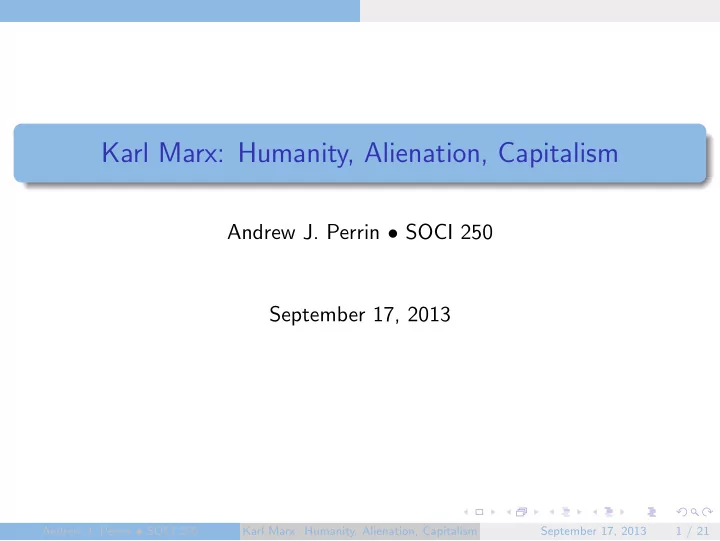

Karl Marx: Humanity, Alienation, Capitalism Andrew J. Perrin • SOCI 250 September 17, 2013 Andrew J. Perrin • SOCI 250 Karl Marx: Humanity, Alienation, Capitalism September 17, 2013 1 / 21
Karl Marx 1818–1883 Andrew J. Perrin • SOCI 250 Karl Marx: Humanity, Alienation, Capitalism September 17, 2013 2 / 21
Karl Marx: Life & Times Academic star in Gymnasium Studied in Bielefeld, then Berlin Early member of “Young Hegelians” Becomes politically active, leaves academia to be activist & journalist Founder of “scientific socialism” movement Living in exile in London, dies and is buried there Andrew J. Perrin • SOCI 250 Karl Marx: Humanity, Alienation, Capitalism September 17, 2013 3 / 21
Andrew J. Perrin • SOCI 250 Karl Marx: Humanity, Alienation, Capitalism September 17, 2013 4 / 21
Big Themes in Marx Dialectical Materialism Parsimony / reductionism Base / Superstructure Conflict / Consent The Theory of History Andrew J. Perrin • SOCI 250 Karl Marx: Humanity, Alienation, Capitalism September 17, 2013 5 / 21
Dialectical Materialism Marx’s theory of historical progression Dialectics: Progression through antagonistic opposition Materialism: Progression through real interests Andrew J. Perrin • SOCI 250 Karl Marx: Humanity, Alienation, Capitalism September 17, 2013 6 / 21
Materialism “Social life is essentially practical . All mysteries. . . find their rational solution in human practice and in the comprehension of this practice.” – Theses on Feuerbach “History is nothing but the succession of the separate generations, each of which exploits the materials, the capital funds, the productive forces handed down to it by all preceding generations.” – The German Ideology Andrew J. Perrin • SOCI 250 Karl Marx: Humanity, Alienation, Capitalism September 17, 2013 7 / 21
Species Being What is special about humans? Humans work What distinguishes human societies is the organization of human production Humans’ species being is a complete link between self and worldly activity Andrew J. Perrin • SOCI 250 Karl Marx: Humanity, Alienation, Capitalism September 17, 2013 8 / 21
Alienation Artificial separation of things that are naturally united Andrew J. Perrin • SOCI 250 Karl Marx: Humanity, Alienation, Capitalism September 17, 2013 9 / 21
Primitive Communism “Primitives” are not alienated from their labor Andrew J. Perrin • SOCI 250 Karl Marx: Humanity, Alienation, Capitalism September 17, 2013 10 / 21
Economic Development Drives Social Change ...and the news isn’t (all) good! 1 Intellectual success breeds economic growth 2 Economic growth enables technological change 3 Technological change brings social change 4 More on this next week Andrew J. Perrin • SOCI 250 Karl Marx: Humanity, Alienation, Capitalism September 17, 2013 11 / 21
Alienation of Labor A person and her work are naturally merged Economic necessity drives society to divorce them Man is therefore alienated from his own labor because it confronts him as external Andrew J. Perrin • SOCI 250 Karl Marx: Humanity, Alienation, Capitalism September 17, 2013 12 / 21
The Commodity Fetish Remember: a fetish is desire misplaced onto an incorrect object Why do people work? to make the stuff they need; 1 because it’s their species being 2 Under capitalism, people don’t understand their own desires; they want things because of the price they command Andrew J. Perrin • SOCI 250 Karl Marx: Humanity, Alienation, Capitalism September 17, 2013 13 / 21
The Origin and Role of Ideas Andrew J. Perrin • SOCI 250 Karl Marx: Humanity, Alienation, Capitalism September 17, 2013 14 / 21 The world of material production is the origin of ideas.
The Origin and Role of Ideas “The ideas of the ruling class are in every epoch the ruling ideas.” ( The German Ideology ) Andrew J. Perrin • SOCI 250 Karl Marx: Humanity, Alienation, Capitalism September 17, 2013 15 / 21
The Origin and Role of Ideas Paradox Why do criticism, then, if it’s material reality and not ideas that move the world? Answer Dialectics! The material and the ideal are dialectically related. Ideas (Superstructure) � Material (Base) Criticism has plucked the imaginary flowers from the chain. . . so that [man] shall cast off the chain and pluck the living flower. Material force can only be overthrown by material force; but theory itself becomes a material force when it has seized the masses. Andrew J. Perrin • SOCI 250 Karl Marx: Humanity, Alienation, Capitalism September 17, 2013 16 / 21
Conflict and Consent History, therefore, is driven by conflicts Conflict is functional and fundamental Consent: a kind of false consciousness produced by the ruling class in an attempt to suppress conflict Andrew J. Perrin • SOCI 250 Karl Marx: Humanity, Alienation, Capitalism September 17, 2013 17 / 21
The Overall Theory of History Primitive society: nomads ⇒ animal husbandry and agriculture Agriculture ⇒ feudal class structure (landowners vs. peasants) Efficient planting ⇒ trading ⇒ trading class (bourgeoisie) Importance of trading grows ⇒ bourgeois revolution (French, American, etc.) Processing and manufacture ⇒ capitalist class structure (capitalists vs. workers) Dependence on workers ⇒ proletarian revolution ⇒ socialism . . . = ⇒ Communism Andrew J. Perrin • SOCI 250 Karl Marx: Humanity, Alienation, Capitalism September 17, 2013 18 / 21
Conventional (Durkheim) View of Progress Progress Time Andrew J. Perrin • SOCI 250 Karl Marx: Humanity, Alienation, Capitalism September 17, 2013 19 / 21
Dialectics Synthesis Thesis Antithesis Synthesis Progress Thesis Antithesis Synthesis Thesis Antithesis Synthesis Thesis Antithesis Andrew J. Perrin • SOCI 250 Karl Marx: Humanity, Alienation, Capitalism September 17, 2013 20 / 21
Dialectics and History Durkheim Marx Weber Progress Time Andrew J. Perrin • SOCI 250 Karl Marx: Humanity, Alienation, Capitalism September 17, 2013 21 / 21
Recommend
More recommend